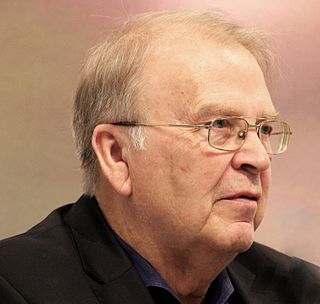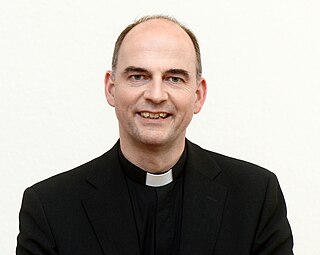
Heinrich Frauenlob, sometimes known as Henry of Meissen, was a Middle High German poet, a representative of both the Sangspruchdichtung and Minnesang genres. He was one of the most celebrated poets of the late medieval period, venerated and imitated well into the 15th century.

Wilhelm Genazino was a German journalist and author. He worked first as a journalist for the satirical magazine pardon and for Lesezeichen. From the early 1970s, he was a freelance writer who became known by a trilogy of novels, Abschaffel-Trilogie, completed in 1979. It was followed by more novels and two plays. Among his many awards is the prestigious Georg Büchner Prize.

Johann Peter Theodor Janssen was a German historical painter.
Gerhard Scherhorn was a German Professor and economist.

Wilhelm Bölsche was a German author, editor and publicist. He was among the early promoters of nature conservation and committed to popularizing science.

Max Bense was a German philosopher, writer, and publicist, known for his work in philosophy of science, logic, aesthetics, and semiotics. His thoughts combine natural sciences, art, and philosophy under a collective perspective and follow a definition of reality, which – under the term existential rationalism – is able to remove the separation between humanities and natural sciences.

Luise Rinser was a German writer, best known for her novels and short stories.
Norbert Müller-Everling is a contemporary German artist working with concrete art.
Karl Marienus Deichgräber was a German classical philologist. Deichgräber was a member of the Nazi Party.

Friedrich Sieburg (1893–1964) was a German journalist. He was born in Altena and died in Gärtringen.
Elisabeth von Samsonow is an Austrian artist and philosopher. She is the Professor for Philosophical and Historical Anthropology at the Kunst an der Akademie der bildenden Künste, Vienna. She is also a member of GEDOK Munich.

Walter Höllerer was a German writer, literary critic, and literature academic. He was professor of literary studies at the Technical University of Berlin from 1959 to 1988. Höllerer was a member of the Group 47, founder of the German literary magazine Akzente (1953) and the Literary Colloquium of Berlin (1963).
Michael Diers is a German art historian and professor of art history in Hamburg and Berlin.

Memoirs of a Good-for-Nothing is a novella by Joseph von Eichendorff. Completed in 1823, it was first printed in 1826. The work is regarded as a pinnacle of musical prose. Eichendorff created an open form with epic and lyrical elements, incorporating several poems and songs in the text. It was first published in English in 1866.
Sven Felix Kellerhoff is a German historian, journalist and author who specialises in the history of the Nazi era.

Franz Jung is a German Roman Catholic bishop.
Rudolph Kurt Angermüller was a German musicologist, who rendered great services to Mozart studies in particular.
Gustav Mensching was a German theologian who was Professor of Comparative Religious Studies at the University of Bonn from 1936 to 1972.
Ernst August Bertram was a German professor of German studies at the University of Cologne, but also a poet and writer who was close to the George-Kreis and the lyricist Stefan George.
Luisa Heese in Göttingen, Lower Saxony), is a German curator and director of the Museum im Kulturspeicher in Würzburg since September 2020. On July 1, 2023, Luisa Heese will leave the museum for the Kunsthalle Mannheim as curator of contemporary art and sculpture.









